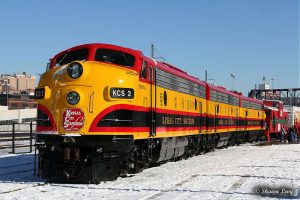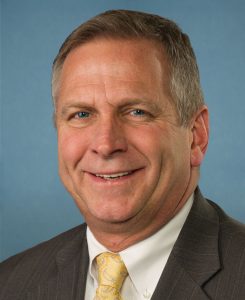Metro East Area News Briefs
Chronicle Media — February 21, 2018Jerseyville to announce major new logistics center
Illinois Gov. Bruce Rauner, Kansas City Southern (KCS) Railroad executives and Jerseyville Mayor William “Billy” Russell have scheduled a March 2 news conference to announce plans for development of a half-million-dollar, multimodal, rail-centered transportation hub, which they predict will have a “transformative” effect on the Jerseyville region and a “major impact on the entire Midwest economy.”
Quietly in the planning stages for at least the past three years, the new rail hub will be used to transfer freight between rail cars and over-the-road trucks — primarily through use of intermodal freight containers, according to the Jerseyville Economic Development Council (JEDC).
Council spokespersons believe the new facility will establish Jerseyville as a major center for the outgoing shipment of commodities from Missouri and Illinois, as well as the distribution of finished goods coming into the Midwest.
Order fulfillment centers, warehouses, manufacturing facilities are expected to be developed around the railyard, according to the JEDC.
“(The multimodal freight facility) will “bring an approximate 1,000 jobs to the area immediately, with another 1,000 or more following in the next several years,” the council predicted in a statement announcing the press conference last week.
Development of the planned transportation hub will be bankrolled by the Atlanta-based Stonemont Financial Group, in partnership with the Jerseyville Economic Development Council and Kansas City Southern Railroad, according to those close to the project.
Also expected to be announced in conjunction with the transportation hub is the expansion of a 31.8-mile stretch of U.S. Hwy. 67, from two to four lanes, from the unincorporated Jersey County community of Delhi, about five miles southeast of Jerseyville, to just past Roodhouse, in northern Greene County.
Kansas City Southern Railroad officials say expansion of the highway will be necessary to accommodate markedly increased truck traffic to and from the new transportation hub.
Trump response to steel import investigation due
Employees at U.S. Steel’s Granite City Works should know by April 11, what action the Trump Administration plans to take to curb the importing for foreign steel — which has been widely blamed for the idling of steel mills here and around the nation.
The U.S. Department of Commerce (DOC), on Jan. 11, submitted to the White House results of a national security investigation on steel imports.
Under federal law, the president has 90 days to assess such reports and determine what, if any, action to take, based on the DOC’s findings.
The report, for the moment, remains confidential and the Commerce Department has not publicly indicated whether the investigation has revealed evidence of a national security threat.
However, Washington observers say the submission of a report to the president suggest a security threat has been identified.
U.S. Rep. Mike Bost (R-12th District), co-chairman of the Congressional Steel Caucus, joined a select, bipartisan group of lawmakers at the White House on Feb. 13, to discuss steel trade policy with President Trump.
In June, Commerce Secretary Wilbur Ross said the White House would basically have three options for restricting imports if his department found evidence of a national security threat: tariffs, quotas or a combination of both, known as a tariff-rate quota.
The investigation was conducted under Section 232 of the 1962 Federal Trade Expansion Act, which authorizes to the president to restrict imports if “the secretary (of commerce) finds that an article is being imported into the United States in such quantities or under such circumstances as to threaten to impair the national security.”
U.S. Steel and other American steel manufacturers blame low-priced steel imports, primarily from South Korea, for a severe downturn in domestic steel production. The U.S. manufacturers contend South Korean steel is being unfairly “dumped” in North America at below-market prices; achieved through the government subsidization of that nation’s steel mills.
U.S. Steel announced the idling of its Granite City Works in March, 2015; citing decreased demand for the mill’s products. Some 2,000 works were laid-off; although a few have since been called back. Employees were also laid off at nearby Alton Steel, a smaller, specialized steel producer.
With up to half of the Granite City economy based, directly or indirectly, on the steel industry; the layoffs have had a devastating effect on the Madison County community, city officials say.
U.S. Steel officials blamed the shut down on both steel imports and a downturn in the petroleum industry, a key consumer of the steel products produced at Granite City.
EWG launching System-wide MetroLink Security Audit
The East West Gateway Council of Government (EWG), the federally recognized central planning agency for the St. Louis region, is taking over and expanding a study of the security of the Bi-State Development Agency’s Metro-Link light rail system.
Following a series of violent incidents on Metro Links trains and boarding platforms, Bi-State officials last year announced they were undertaking a feasibility and design study for a rail station barrier system. The proposed network of guard walls would better protect the light rail system from unauthorized entry, they said.
However, the planning council’s January meeting, EWG Executive Director Jim Wild reported that Bi-State has now asked EWG to take over the study.
EWG staff now plans to expand the initiative into a System-wide MetroLink Security Audit that will focus on inventorying the physical conditions/characteristics of stations, identifying current policy/procedural protocols, data collection and analysis, and assessing current human capital related to safety and security of the system.
“The security audit will result in recommendations related to addressing identified challenges/weaknesses. The new approach will allow for an objective analysis of the security of the system, including access control, and the implementation of treatments/activities to address observed problems rather than perceived weaknesses,” according to minutes of the EWG’s January board meeting.
A second phase of the effort will consist of prioritization, design, and implementation of the recommendations from the security audit, board minutes state.
The security audit is expected to cost up to $3.6 million. Bi-State will still pay for the study, with a combination of federal and local funding, Wild said.
Col. Maher takes command at Scott AFB
Col. Leslie Maher assumes command of the U.S. Air Force’s 375th Air Mobility Wing, effective Feb. 20; thereby also becoming commander of Scott Air Force Base, the wing’s base of operations.
Col. Maher has been serving as director of the Special Access Program Management Office, Headquarters Air Mobility Command, at Scott AFB.
Her past posts include commander of the Joint-Task Force-Port Opening, which specializes in establishing Air Force cargo distribution hubs worldwide, and commander of the 6th Operations Support Squadron at MacDill Air Force Base in Florida.
Col. Maher is taking over command of the Air Force base, after Col. John Howard was relieved of command on Dec. 12 of last year. Days later, the base issued a statement saying the Air Force Office of Special Investigations was leading an investigation into alleged sexual misconduct by Howard.
Col. W. Chris Buschur, vice commander of the 375th Air Mobility Wing, has been serving as interim commander since.
–Metro East Area News Briefs–





